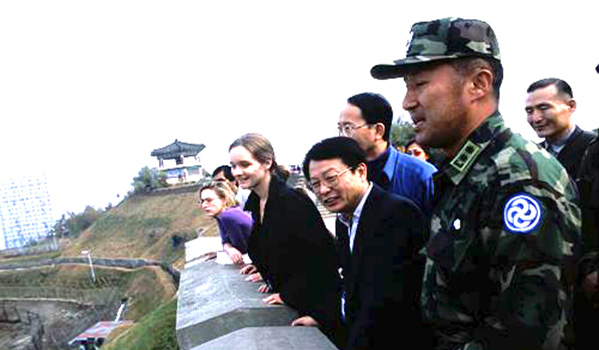20 October 2014
Republic of Korea Passes Historic Landmine Victim Assistance Law

Dr. Jai-kook Cho, Head of ICBL member in Korea, Peace Sharing Association (formerly the Korean Campaign to Ban Landmines) on a 2001 visit to the demiliterized zone.
Eleven years after it was first submitted for vote to the National Assembly, the SpecialAct on Landmine Victim Assistance was passed by the South Korean Congress on 30 September, 2014.
The Special Act publicly announced last week stipulates that those who fall victim to landmines, and the family members of those killed by the weapon and designated as their heirs, will receive compensation, according to ICBL member, Peace Sharing Association or PSA (formerly the Korean Campaign to Ban Landmines). The PSA has been pushing for legislation supporting victim’s rights since 2001. A copy of the legislation in Korean can be downloaded here.
In the wake of the Korean War, landmines have continued to claim lives and injure civilians in the Republic of Korea, due to poor or non-existent mine warning signs. Many victims failed to receive compensation and have suffered difficult lives.
“The adoption of the act for compensation is a historic achievement for mine victims in Korea,” said Dr. Jai-kook Cho, Head of the Korean campaign. “We are looking forward to full implementation of the Act. We do not want to see any more casualties from antipersonnel landmines in Korea and call on the Republic of Korea to eliminate all landmines as soon as possible,” Dr. Cho added.
The landmark achievement came as a result of persistent lobbying and outreach by the KCBL/PSA and its members in Korea. Over the past several years KCBL/PSA has carried out sustained advocacy activities including meeting with authorities, mobilizing media to expose the challenges faced by mine victims, presentations urging members of the National Assembly to address the needs of mine victims, and public outreach including staging photo exhibitions at the Palais de Seoul gallery and the National Assembly in 2013. All activities have focused on the adoption of national legislation to address the rights of landmine victims.
"While long overdue, the passage of this compensation act is an important acknowledgement by the authorities in South Korea of the negative impact from use of this weapon,” said Yeshua Moser-Puangsuwan, of the Landmine Monitor. “The Korean congress is also in the process of passing a law allowing humanitarian demining within the country. This together with the fact that the majority of non-DMZ (demilitarized zone) mines have been scheduled for removal, is very good news. Removing the mines will ensure there are no future victims from these indiscriminate weapons," he added.
The Republic of Korea has not joined the Mine Ban Treaty but has acknowledged the negative humanitarian impact of antipersonnel landmines. Since 1997, Korea has had in place an indefinite moratorium on the export of antipersonnel landmines. The number of mine/explosive remnants of war casualties is estimated to be between 500 and 3,000 individuals and the estimated number of survivors at between 1,000 and 2,000.
“Adoption of this bill certainly constitutes an important first step. The Republic of Korea must now work towards joining the 162 States Parties to the Mine Ban Treaty and the global commitment to a mine-free world,” said Dr. Jai-kook Cho.


